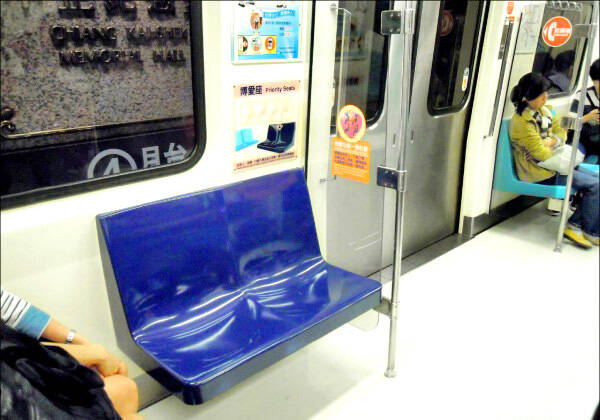A draft amendment that would allow priority seats on public transportation to be given to “people with actual need” instead of only elderly people, women and children passed a legislative committee on Thursday.
The legislature’s Social Welfare and Environmental Hygiene Committee passed the draft amendment proposed by the Executive Yuan to the People With Disabilities Rights Protection Act (身心障礙者權益保障法).
The amended version removes the words “elderly, women and children” to allow “people with actual need” to use priority seats, said Chien Hui-chuan (簡慧娟), director of the Ministry of Health and Welfare’s Social and Family Affairs Administration.

Photo: Chien Li-chung, Taipei Times
A similar proposal has also been put forward by Democratic Progressive Party legislators Wu Yu-chin (吳玉琴), Lin Yi-chin (林宜瑾) and Chen Ming-wen (陳明文) along with Chinese Nationalist Party (KMT) Legislator Chang Yu-mei (張育美).
Article 58, Paragraph 2 of the act stipulates that people with disabilities and one of their necessary companions may also use priority seats.
The committee agreed to remove the word “may” from the paragraph following a suggestion by Wu.
Wu and others also proposed a draft that would require city and county governments to integrate local transportation methods, including taxis, Rehabus — a government-sponsored bus service for transporting people with disabilities — and other accessible transportation services to meet the needs of disabled people.
Local governments have made efforts to provide more convenient transportation services to people with disabilities, but the proposal was made as there is room for improvement, Chien said.
The proposal was passed by the committee.
Article 59 of the act stipulates that people with disabilities may be exempted from admittance fees when entering public scenic areas, entertainment venues, or cultural and educational areas, and would only pay half the price at private ones.
Wu proposed to include sports and exercise facilities to the article.
Chien said that public sports venues already provide discounts to disabled people, but the government has to further deliberate on discounts at private sports and exercise facilities, as it might affect the spending of local governments and businesses.
The Ministry of Education’s Department of Student Affairs and Special Education officer Chen Tien-ting (陳添丁) said his ministry welcomes the proposal, as it encourages people with disabilities to participate in social events.
However, more assessments are needed before amendments can be made to order private venues to offer discounts to disabled people, he said.
Wu agreed to turn the proposal into an attached resolution that encourages private businesses to support people with disabilities to participate in sports.

Chinese spouse and influencer Guan Guan’s (關關) residency permit has been revoked for repeatedly posting pro-China videos that threaten national security, the National Immigration Agency confirmed today. Guan Guan has said many controversial statements in her videos posted to Douyin (抖音), including “the red flag will soon be painted all over Taiwan” and “Taiwan is an inseparable part of China,” and expressing hope for expedited reunification. The agency last year received multiple reports alleging that Guan Guan had advocated for armed reunification. After verifying the reports, the agency last month issued a notice requiring her to appear and explain her actions. Guan

GIVE AND TAKE: Blood demand continues to rise each year, while fewer young donors are available due to the nation’s falling birthrate, a doctor said Blood donors can redeem points earned from donations to obtain limited edition Formosan black bear travel mugs, the Kaohsiung Blood Center said yesterday, as it announced a goal of stocking 20,000 units of blood prior to the Lunar New Year. The last month of the lunar year is National Blood Donation Month, when local centers seek to stockpile blood for use during the Lunar New Year holiday. The blood demand in southern Taiwan — including Tainan and Kaohsiung, as well as Chiayi, Pingtung, Penghu and Taitung counties — is about 2,000 units per day, the center said. The donation campaign aims to boost

The Kaohsiung Tourism Bureau audited six hotels in an effort to prevent price gouging ahead of Korean band BTS’ concert tour in the city scheduled for Nov. 19, 21 and 22 this year. The bureau on Friday said that the audits — conducted in response to allegations of unfair pricing posted on social media — found no wrongdoing. These establishments included the local branches of Chateau de Chine, Hotel Nikko, My Humble House, and Grand Hai Lai, it said, adding that the Consumer Protection Commission would have penalized price gougers had the accusations been substantiated. The bureau said the Tourism Development Act

BACK TO WINTER: A strong continental cold air mass would move south on Tuesday next week, bringing colder temperatures to northern and central Taiwan A tropical depression east of the Philippines could soon be upgraded to be the first tropical storm of this year, the Central Weather Administration (CWA) said yesterday, adding that the next cold air mass is forecast to arrive on Monday next week. CWA forecaster Cheng Jie-ren (鄭傑仁) said the first tropical depression of this year is over waters east of the Philippines, about 1,867km southeast of Oluanpi (鵝鑾鼻), and could strengthen into Tropical Storm Nokaen by early today. The system is moving slowly from northwest to north, and is expected to remain east of the Philippines with little chance of affecting Taiwan,